#for a large local nonprofit
Text
🏳️🌈🏳️⚧️ GOOD queer news for the TL: a bunch of students across the U.S. are using grants to make their schools more welcoming for LGBTQ+ youth

Queer students deserve to feel safe at school! We're in our third year of giving grants to put the power in their hands to make their schools more welcoming - students know what they need most in their own communities and their own schools.
Through 50 States, 50 Grants, 5,000 Voices, we've awarded over $1.5 million in grants across the U.S. to support student-led projects. Our third season has some of the most badass projects yet, like these:
❤️ “With this grant, we’ll establish an LGBTQIA+ community space in the library, open to all students, with guest speakers, arts and crafts, LGBTQIA+ books and literature, and LGBTQIA+-specific resources.” - Pocatello, Idaho
🧡 “Our project aims to support LGBTQ+ students through teacher training, development of gender-neutral bathroom protocols, and the organization of a district-wide Queer Prom.” - Gypsum, Colorado
💛 “We’ll take students from the 3 middle schools and our local high school to Honolulu Pride to make local LGBTQ+ friends, feel accepted in a large group, and see the community beyond just school.” - Ewa Beach, Hawai'i
💚 “We’re going to increase access to queer literature by working with a local nonprofit to expand our school’s collection, host storytelling events, and foster community connection." - Mobile, Alabama
💙 “Our plan is to create new Inclusivity Zones across the state in critical areas for local GSA clubs to meet, plan shared events, and be their own safe space.” - Charleston, West Virginia
💜 “We’ll host the Rainbow Youth Summit for LGBTQIA+ youth from across southern California to network, learn, and have fun in a safe, judgement free and supportive environment.” - Cathedral City, California
These students are truly the definition of making things better - you can see the rest of the amazing projects lined up across the country on our blog here!
27K notes
·
View notes
Text
Defeating Tr*mp and the Republican party: how you can help
So as you've probably heard, there is a presidential election coming up in the US this November. You may even be experiencing some concern about the outcome of that election -- given both the high stakes and the active efforts by Republicans to suppress the vote -- and wondering what more you can do to stave off the possibility of a literal fascist takeover of the United States.
The good news is: you're not helpless. There are wonderful organizations out there -- staffed by knowledgeable, talented people with their feet already on the ground -- and they could use your help.
Here are a few of them:
VoteBeat offers deeply-researched local reporting about elections, which is both valuable and rare in the current news environment. A spinoff of ChalkBeat, it was founded and is run by journalists from ProPublica.
Spread the Vote is an organization that works on the ground to help every eligible voter secure the documentation and the access they need to make their voices heard. In particular, StV runs a program called Vote by Mail in Jail to help ensure that incarcerated persons also have access to these rights.
VoteRiders, like StV, works to ensure that every American has the opportunity to vote. In particular, they provide financial and practical support to trans people so that they can get hold of the documentation they need and can vote safely and confidently.
FairVote advocates for ranked-choice voting, a system in wide use outside the US which far more effectively captures the will of the electorate. (we don't have an individual feature page for them, but FV was one of FTH's supported orgs in 2020.)
(This is just a short starter list of amazing organizations, pulled from FTH's supported orgs list in past years; there are plenty of others. Please feel free to add them in reblogs!)
Ways you can help
Donate to one (or more!) of these organizations. These are all fairly small operations, even if their goals and their impact is large; they could use the help!
Volunteer your time. Many of these organizations rely on volunteers to make their day-to-day operations work. Sometimes it's necessary to do this volunteering in person, but often there is a remote option for volunteering if that's what works for you.
Run a fanworks auction to raise money. FTH recently rolled out a full and detailed playbook, sharing all of our organizational materials and step-by-step guides for how to use them and adapt them to your needs. This is a great moment to put that to work!
Whether you want to raise money for one of the organizations listed above, or for some other nonprofit, or even for a progressive local candidate that could use the support (FTH doesn't do individual candidates, but you shouldn't let that stop you!) you can make a real difference while also helping to put more fanworks into the world.
#2024 elections#organizing#voteriders#spread the vote#votebeat#fair vote#supported orgs#fth playbook#voting#us elections#usa election#election 2024
793 notes
·
View notes
Text
"Despite the Central Appalachia ecosystem being historically famous as coal country, under this diverse broadleaf canopy lies a rich, biodiverse world of native plants helping to fill North America’s medicinal herb cabinet.
And it turns out that the very communities once reliant on the coalfields are now bringing this botanical diversity to the country.
“Many different Appalachian people, stretching from pre-colonization to today, have tended, harvested, sold, and used a vast number of forest botanicals like American ginseng, ramps, black cohosh, and goldenseal,” said Shannon Bell, Virginia Tech professor in the Dept. of Sociology. “These plants have long been integral to many Appalachians’ livelihoods and traditions.”
50% of the medicinal herbs, roots, and barks in the North American herbal supply chain are native to the Appalachian Mountains, and the bulk of these species are harvested or grown in Central Appalachia, which includes southern West Virginia, eastern Kentucky, far-southwest Virginia, and east Tennessee.
The United Plant Savers, a nonprofit with a focus on native medicinal plants and their habitats, has identified many of the most popular forest medicinals as species of concern due to their declining populations.
Along with the herbal supply chain being largely native to Appalachia, the herb gatherers themselves are also native [to Appalachia, not Native American specifically], but because processing into medicine and seasonings takes place outside the region, the majority of the profits from the industry do too.
In a press release on Bell’s superb research and advocacy work within Appalachia’s botanical communities, she refers back to the moment that her interest in the industry and the region sprouted; when like many of us, she was out in a nearby woods waiting out the pandemic.
“My family and I spent a lot of time in the woods behind our house during quarantine,” Bell said. “We observed the emergence of all the spring ephemerals in the forest understory – hepatica, spring beauty, bloodroot, trillium, mayapple. I came to appreciate the importance of the region’s botanical biodiversity more than ever, and realized I wanted to incorporate this new part of my life into my research.”
With co-investigator, John Munsell at VA Tech’s College of Natural Resources and Environment, Bell’s project sought to identify ways that Central Appalachian communities could retain more of the profits from the herbal industry while simultaneously ensuring that populations of at-risk forest botanicals not only survive, but thrive and expand in the region.
Bell conducted participant observation and interviews with wild harvesters and is currently working on a mail survey with local herb buyers. She also piloted a ginseng seed distribution program, and helped a wild harvester write a grant proposal to start a forest farm.
“Economic development in post-coal communities often focuses on other types of energy development, like fracking and natural gas pipelines, or on building prisons and landfills. Central Appalachia is one of the most biodiverse places on the planet. I think that placing a greater value on this biodiversity is key to promoting a more sustainable future for the region,” Bell told VA Tech press.
Armed with a planning grant of nearly half a million dollars, Bell and collaborators are specifically targeting forest farming as a way to achieve that sustainable future.
Finally, enlisting support from the nonprofit organization Appalachian Sustainable Development, Virginia Tech, the City of Norton, a sculpture artist team, and various forest botanicals practitioners in her rolodex, Bell organized the creation of a ‘living monument’ along Flag Rock Recreation Area in Norton, Virginia.
An interpretive trail, the monument tells the story of the historic uses that these wild botanicals had for the various societies that have inhabited Appalachia, and the contemporary value they still hold for people today."
-via Good News Network, September 12, 2024
#appalachia#united states#biodiversity#herbs#herbal medicine#herbalism#native plants#conservation#sustainability#sustainable agriculture#solarpunk#good news#hope
480 notes
·
View notes
Text
How to shatter the class solidarity of the ruling class
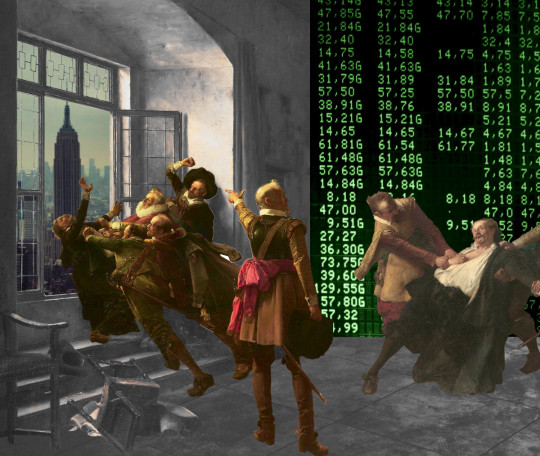
I'm touring my new, nationally bestselling novel The Bezzle! Catch me WEDNESDAY (Apr 11) at UCLA, then Chicago (Apr 17), Torino (Apr 21) Marin County (Apr 27), Winnipeg (May 2), Calgary (May 3), Vancouver (May 4), and beyond!

Audre Lorde counsels us that "The Master's Tools Will Never Dismantle the Master's House," while MLK said "the law cannot make a man love me, but it can restrain him from lynching me." Somewhere between replacing the system and using the system lies a pragmatic – if easily derailed – course.
Lorde is telling us that a rotten system can't be redeemed by using its own chosen reform mechanisms. King's telling us that unless we live, we can't fight – so anything within the system that makes it easier for your comrades to fight on can hasten the end of the system.
Take the problems of journalism. One old model of journalism funding involved wealthy newspaper families profiting handsomely by selling local appliance store owners the right to reach the townspeople who wanted to read sports-scores. These families expressed their patrician love of their town by peeling off some of those profits to pay reporters to sit through municipal council meetings or even travel overseas and get shot at.
In retrospect, this wasn't ever going to be a stable arrangement. It relied on both the inconstant generosity of newspaper barons and the absence of a superior way to show washing-machine ads to people who might want to buy washing machines. Neither of these were good long-term bets. Not only were newspaper barons easily distracted from their sense of patrician duty (especially when their own power was called into question), but there were lots of better ways to connect buyers and sellers lurking in potentia.
All of this was grossly exacerbated by tech monopolies. Tech barons aren't smarter or more evil than newspaper barons, but they have better tools, and so now they take 51 cents out of every ad dollar and 30 cents out of ever subscriber dollar and they refuse to deliver the news to users who explicitly requested it, unless the news company pays them a bribe to "boost" their posts:
https://www.eff.org/deeplinks/2023/04/saving-news-big-tech
The news is important, and people sign up to make, digest, and discuss the news for many non-economic reasons, which means that the news continues to struggle along, despite all the economic impediments and the vulture capitalists and tech monopolists who fight one another for which one will get to take the biggest bite out of the press. We've got outstanding nonprofit news outlets like Propublica, journalist-owned outlets like 404 Media, and crowdfunded reporters like Molly White (and winner-take-all outlets like the New York Times).
But as Hamilton Nolan points out, "that pot of money…is only large enough to produce a small fraction of the journalism that was being produced in past generations":
https://www.hamiltonnolan.com/p/what-will-replace-advertising-revenue
For Nolan, "public funding of journalism is the only way to fix this…If we accept that journalism is not just a business or a form of entertainment but a public good, then funding it with public money makes perfect sense":
https://www.hamiltonnolan.com/p/public-funding-of-journalism-is-the
Having grown up in Canada – under the CBC – and then lived for a quarter of my life in the UK – under the BBC – I am very enthusiastic about Nolan's solution. There are obvious problems with publicly funded journalism, like the politicization of news coverage:
https://www.theguardian.com/media/2023/jan/24/panel-approving-richard-sharp-as-bbc-chair-included-tory-party-donor
And the transformation of the funding into a cheap political football:
https://www.cbc.ca/news/politics/poilievre-defund-cbc-change-law-1.6810434
But the worst version of those problems is still better than the best version of the private-equity-funded model of news production.
But Nolan notes the emergence of a new form of hedge fund news, one that is awfully promising, and also terribly fraught: Hunterbrook Media, an investigative news outlet owned by short-sellers who pay journalists to research and publish damning reports on companies they hold a short position on:
https://hntrbrk.com/
For those of you who are blissfully distant from the machinations of the financial markets, "short selling" is a wager that a company's stock price will go down. A gambler who takes a short position on a company's stock can make a lot of money if the company stumbles or fails altogether (but if the company does well, the short can suffer literally unlimited losses).
Shorts have historically paid analysts to dig into companies and uncover the sins hidden on their balance-sheets, but as Matt Levine points out, journalists work for a fraction of the price of analysts and are at least as good at uncovering dirt as MBAs are:
https://www.bloomberg.com/opinion/articles/2024-04-02/a-hedge-fund-that-s-also-a-newspaper
What's more, shorts who discover dirt on a company still need to convince journalists to publicize their findings and trigger the sell-off that makes their short position pay off. Shorts who own a muckraking journalistic operation can skip this step: they are the journalists.
There's a way in which this is sheer genius. Well-funded shorts who don't care about the news per se can still be motivated into funding freely available, high-quality investigative journalism about corporate malfeasance (notoriously, one of the least attractive forms of journalism for advertisers). They can pay journalists top dollar – even bid against each other for the most talented journalists – and supply them with all the tools they need to ply their trade. A short won't ever try the kind of bullshit the owners of Vice pulled, paying themselves millions while their journalists lose access to Lexisnexis or the PACER database:
https://pluralistic.net/2024/02/24/anti-posse/#when-you-absolutely-positively-dont-give-a-solitary-single-fuck
The shorts whose journalists are best equipped stand to make the most money. What's not to like?
Well, the issue here is whether the ruling class's sense of solidarity is stronger than its greed. The wealthy have historically oscillated between real solidarity (think of the ultrawealthy lobbying to support bipartisan votes for tax cuts and bailouts) and "war of all against all" (as when wealthy colonizers dragged their countries into WWI after the supply of countries to steal ran out).
After all, the reason companies engage in the scams that shorts reveal is that they are profitable. "Behind every great fortune is a great crime," and that's just great. You don't win the game when you get into heaven, you win it when you get into the Forbes Rich List.
Take monopolies: investors like the upside of backing an upstart company that gobbles up some staid industry's margins – Amazon vs publishing, say, or Uber vs taxis. But while there's a lot of upside in that move, there's also a lot of risk: most companies that set out to "disrupt" an industry sink, taking their investors' capital down with them.
Contrast that with monopolies: backing a company that merges with its rivals and buys every small company that might someday grow large is a sure thing. Shriven of "wasteful competition," a company can lower quality, raise prices, capture its regulators, screw its workers and suppliers and laugh all the way to Davos. A big enough company can ignore the complaints of those workers, customers and regulators. They're not just too big to fail. They're not just too big to jail. They're too big to care:
https://pluralistic.net/2024/04/04/teach-me-how-to-shruggie/#kagi
Would-be monopolists are stuck in a high-stakes Prisoner's Dilemma. If they cooperate, they can screw over everyone else and get unimaginably rich. But if one party defects, they can raid the monopolist's margins, short its stock, and snitch to its regulators.
It's true that there's a clear incentive for hedge-fund managers to fund investigative journalism into other hedge-fund managers' portfolio companies. But it would be even more profitable for both of those hedgies to join forces and collude to screw the rest of us over. So long as they mistrust each other, we might see some benefit from that adversarial relationship. But the point of the 0.1% is that there aren't very many of them. The Aspen Institute can rent a hall that will hold an appreciable fraction of that crowd. They buy their private jets and bespoke suits and powdered rhino horn from the same exclusive sellers. Their kids go to the same elite schools. They know each other, and they have every opportunity to get drunk together at a charity ball or a society wedding and cook up a plan to join forces.
This is the problem at the core of "mechanism design" grounded in "rational self-interest." If you try to create a system where people do the right thing because they're selfish assholes, you normalize being a selfish asshole. Eventually, the selfish assholes form a cozy little League of Selfish Assholes and turn on the rest of us.
Appeals to morality don't work on unethical people, but appeals to immorality crowds out ethics. Take the ancient split between "free software" (software that is designed to maximize the freedom of the people who use it) and "open source software" (identical to free software, but promoted as a better way to make robust code through transparency and peer review).
Over the years, open source – an appeal to your own selfish need for better code – triumphed over free software, and its appeal to the ethics of a world of "software freedom." But it turns out that while the difference between "open" and "free" was once mere semantics, it's fully possible to decouple the two. Today, we have lots of "open source": you can see the code that Google, Microsoft, Apple and Facebook uses, and even contribute your labor to it for free. But you can't actually decide how the software you write works, because it all takes a loop through Google, Microsoft, Apple or Facebook's servers, and only those trillion-dollar tech monopolists have the software freedom to determine how those servers work:
https://pluralistic.net/2020/05/04/which-side-are-you-on/#tivoization-and-beyond
That's ruling class solidarity. The Big Tech firms have hidden a myriad of sins beneath their bafflegab and balance-sheets. These (as yet) undiscovered scams constitute a "bezzle," which JK Galbraith defined as "the magic interval when a confidence trickster knows he has the money he has appropriated but the victim does not yet understand that he has lost it."
The purpose of Hunterbrook is to discover and destroy bezzles, hastening the moment of realization that the wealth we all feel in a world of seemingly orderly technology is really an illusion. Hunterbrook certainly has its pick of bezzles to choose from, because we are living in a Golden Age of the Bezzle.
Which is why I titled my new novel The Bezzle. It's a tale of high-tech finance scams, starring my two-fisted forensic accountant Marty Hench, and in this volume, Hench is called upon to unwind a predatory prison-tech scam that victimizes the most vulnerable people in America – our army of prisoners – and their families:
https://us.macmillan.com/books/9781250865878/thebezzle
The scheme I fictionalize in The Bezzle is very real. Prison-tech monopolists like Securus and Viapath bribe prison officials to abolish calls, in-person visits, mail and parcels, then they supply prisoners with "free" tablets where they pay hugely inflated rates to receive mail, speak to their families, and access ebooks, distance education and other electronic media:
https://pluralistic.net/2024/04/02/captive-customers/#guillotine-watch
But a group of activists have cornered these high-tech predators, run them to ground and driven them to the brink of extinction, and they've done it using "the master's tools" – with appeals to regulators and the finance sector itself.
Writing for The Appeal, Dana Floberg and Morgan Duckett describe the campaign they waged with Worth Rises to bankrupt the prison-tech sector:
https://theappeal.org/securus-bankruptcy-prison-telecom-industry/
Here's the headline figure: Securus is $1.8 billion in debt, and it has eight months to find a financier or it will go bust. What's more, all the creditors it might reasonably approach have rejected its overtures, and its bonds have been downrated to junk status. It's a dead duck.
Even better is how this happened. Securus's debt problems started with its acquisition, a leveraged buyout by Platinum Equity, who borrowed heavily against the firm and then looted it with bogus "management fees" that meant that the debt continued to grow, despite Securus's $700m in annual revenue from America's prisoners. Platinum was just the last in a long line of PE companies that loaded up Securus with debt and merged it with its competitors, who were also mortgaged to make profits for other private equity funds.
For years, Securus and Platinum were able to service their debt and roll it over when it came due. But after Worth Rises got NYC to pass a law making jail calls free, creditors started to back away from Securus. It's one thing for Securus to charge $18 for a local call from a prison when it's splitting the money with the city jail system. But when that $18 needs to be paid by the city, they're going to demand much lower prices. To make things worse for Securus, prison reformers got similar laws passed in San Francisco and in Connecticut.
Securus tried to outrun its problems by gobbling up one of its major rivals, Icsolutions, but Worth Rises and its coalition convinced regulators at the FCC to block the merger. Securus abandoned the deal:
https://worthrises.org/blogpost/securusmerger
Then, Worth Rises targeted Platinum Equity, going after the pension funds and other investors whose capital Platinum used to keep Securus going. The massive negative press campaign led to eight-figure disinvestments:
https://www.latimes.com/business/story/2019-09-05/la-fi-tom-gores-securus-prison-phone-mass-incarceration
Now, Securus's debt became "distressed," trading at $0.47 on the dollar. A brief, covid-fueled reprieve gave Securus a temporary lifeline, as prisoners' families were barred from in-person visits and had to pay Securus's rates to talk to their incarcerated loved ones. But after lockdown, Securus's troubles picked up right where they left off.
They targeted Platinum's founder, Tom Gores, who papered over his bloody fortune by styling himself as a philanthropist and sports-team owner. After a campaign by Worth Rises and Color of Change, Gores was kicked off the Los Angeles County Museum of Art board. When Gores tried to flip Securus to a SPAC – the same scam Trump pulled with Truth Social – the negative publicity about Securus's unsound morals and financials killed the deal:
https://twitter.com/WorthRises/status/1578034977828384769
Meanwhile, more states and cities are making prisoners' communications free, further worsening Securus's finances:
https://pluralistic.net/2024/02/14/minnesota-nice/#shitty-technology-adoption-curve
Congress passed the Martha Wright-Reed Just and Reasonable Communications Act, giving the FCC the power to regulate the price of federal prisoners' communications. Securus's debt prices tumbled further:
https://www.govtrack.us/congress/bills/117/s1541
Securus's debts were coming due: it owes $1.3b in 2024, and hundreds of millions more in 2025. Platinum has promised a $400m cash infusion, but that didn't sway S&P Global, a bond-rating agency that re-rated Securus's bonds as "CCC" (compare with "AAA"). Moody's concurred. Now, Securus is stuck selling junk-bonds:
https://www.govtrack.us/congress/bills/117/s1541
The company's creditors have given Securus an eight-month runway to find a new lender before they force it into bankruptcy. The company's debt is trading at $0.08 on the dollar.
Securus's major competitor is Viapath (prison tech is a duopoly). Viapath is also debt-burdened and desperate, thanks to a parallel campaign by Worth Rises, and has tried all of Securus's tricks, and failed:
https://pestakeholder.org/news/american-securities-fails-to-sell-prison-telecom-company-viapath/
Viapath's debts are due next year, and if Securus tanks, no one in their right mind will give Viapath a dime. They're the walking dead.
Worth Rise's brilliant guerrilla warfare against prison-tech and its private equity backers are a master class in using the master's tools to dismantle the master's house. The finance sector isn't a friend of justice or working people, but sometimes it can be used tactically against financialization itself. To paraphrase MLK, "finance can't make a corporation love you, but it can stop a corporation from destroying you."
Yes, the ruling class finds solidarity at the most unexpected moments, and yes, it's easy for appeals to greed to institutionalize greediness. But whether it's funding unbezzling journalism through short selling, or freeing prisons by brandishing their cooked balance-sheets in the faces of bond-rating agencies, there's a lot of good we can do on the way to dismantling the system.

If you'd like an essay-formatted version of this post to read or share, here's a link to it on pluralistic.net, my surveillance-free, ad-free, tracker-free blog:
https://pluralistic.net/2024/04/08/money-talks/#bullshit-walks

Image:
KMJ (modified)
https://commons.wikimedia.org/wiki/File:Boerse_01_KMJ.jpg
CC BY-SA 3.0
https://creativecommons.org/licenses/by-sa/3.0/deed.en
#pluralistic#shorts#short sellers#news#private equity#private prisons#securus#prison profiteers#the bezzle#anything that cant go on forever eventually stop#steins law#hamilton nolan#Platinum Equity#American Securities#viapath#global tellink#debt#jpay#worth rises#insurance#spacs#fcc#bond rating#moodys#the appeal#saving the news from big tech#hunterbrook media#journalism
804 notes
·
View notes
Text
The Best News of Last Week - October 30, 2023
1. Bill to Ban Hidden Fees in California Signed into Law

California Attorney General Rob Bonta has released a statement regarding the signing of Senate Bill 478 (SB 478). SB 478, coauthored by Senators Bill Dodd and Nancy Skinner, will eliminate hidden fees, also known as 'junk fees,' in California starting from July 1, 2024. Hidden fees are deceptive charges that sellers include in transactions, either through obscured disclosures or later revelations, impacting consumers negatively.
2. New Portable Water Treatment System Vaporizes 99% of ‘Forever Chemicals’
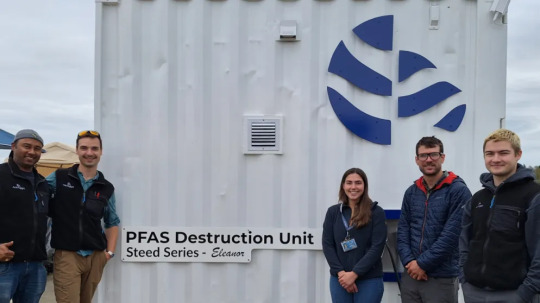
A startup based Washington has devised a portable system capable of removing the vast majority of per- and polyfluoroalkyl substances, or PFAS, from water.
The system uses hydrothermal alkaline treatment, or HALT, to eliminate 99% of forever chemicals from water.
3. Tumor-destroying sound waves receive FDA approval for liver treatment in humans

The U.S. Food and Drug Administration has approved the use of sound waves to break down tumors—a technique called histotripsy—in humans for liver treatment. Technique developed at the University of Michigan provides a noninvasive alternative to surgery, chemotherapy and radiation treatments for cancer
4. Japan's top court says trans sterilisation requirement unconstitutional

Japan's Supreme Court has ruled that it is unconstitutional to require citizens to be sterilised before they can officially change genders.
The 2004 law said people could only change their gender if they have no reproductive capacity. Wednesday's ruling came after a transgender woman filed a petition challenging the law.
5. Abandoned golf courses are being reclaimed by nature

Golf courses, despite occupying large green spaces, are not necessarily good for the environment.
Conservation nonprofits and local authorities are looking to acquire golf courses that have been abandoned due to high maintenance costs, low player numbers or other reasons, and repurpose them into landscapes that boost biodiversity and build natural defenses against climate change.
6. NSW court allows health officials to give blood transfusion to Jehovah's Witness toddler

Regional New South Wales health officials have won a court order authorising them to give a blood transfusion to a Jehovah's Witness toddler if needed in surgery. The Supreme Court has been told the girl, three, who can only be referred to as JI, is in need of two surgical procedures.
On such an application, the overriding criterion to be applied by the court is the best interests and welfare of the child.
7. North Atlantic right whale population has steadied, scientists say

The population of critically endangered North Atlantic right whales appears to have levelled off after a decade of steep decline, according to updated data released this morning by Canadian and American scientists. Scientists in the consortium said Monday that the 2021 estimate of 340 North Atlantic right whales in existence has been recalculated to 365 primarily because of the number of calves born that year.
The estimate for 2022 is 356.
---
That's it for this week :)
This newsletter will always be free. If you liked this post you can support me with a small kofi donation here:
Buy me a coffee ❤️
Also don’t forget to reblog this post with your friends.
593 notes
·
View notes
Text
🩷🩵🤍 5 Days Until my Surgery 🤍🩵🩷

(Picture taken September 1, 2022)
I'm very very excited for my surgery (it's my second gender affirming surgery but this one is more significant to me since it'll be top and bottom surgery) and I'm obviously counting the days until it and I thought some people might be interested in my trans journey 🏳️⚧️ So see part 6 below the cut.
Part 1 here
Me and my partner got back together and got a place together and we still live in this apartment together 🥰 I also worked at worked at a local amusement park over the summer that had some fun but mostly was horrible due to angry customers that kept misgendering me and kids making fun of me 🙃 But also I'll say I had one of my most euphoric moment when this little girl pointed to her winged eyeliner and said "you're just like me!" Bc I also had winged eyeliner at the time 🥰

(Picture taken June 6th, 2022)
Also, if the last Era was the peak of my egirl era on twitter than this was the fall of my egirl era 📉
I remember reaching 10k followers and thinking "ok I have enough of a following to try to make money off this." It's what a lot of egirls on there did and as I stated above, I hated my job. I thought briefly about streaming and YouTube but I don't really have the personality for streaming and was too self-conscious of my voice to do YouTube. And there were a lot of sex workers on twitter that I knew, followed, and admired. And there was quite the market for trans sexual content. Also I wanted to basically be paid to look pretty all day 🤷♀️ So, I made a OnlyFans account and started promoting it.

(Picture taken May 9th, 2022)
And I quickly got shadow banned for it 😂 And frankly, I wasn't really meant for sex work. I'm not really a sexual person. I do enjoy sexual acts but doing them for money killed my drive for it. I made a few hundred dollars but I didn't make enough content for it to keep it up.
Also, the shadow banned revealed how unhealthy my relationship with Twitter was. My self worth would be highly dependent on how well my posts did that day (I was still posting pictures daily). And I was hypercritical of my picture quality and my physical features. And developed a bad habit of comparing myself to girls I considered prettier than me. And with the constant misgendering from work, I was at a big low 🥲

(Picture taken September 17th, 2022)
I remember this was when there was first talk about Elon buying Twitter and I was looking for an alternative and well... ended up here.
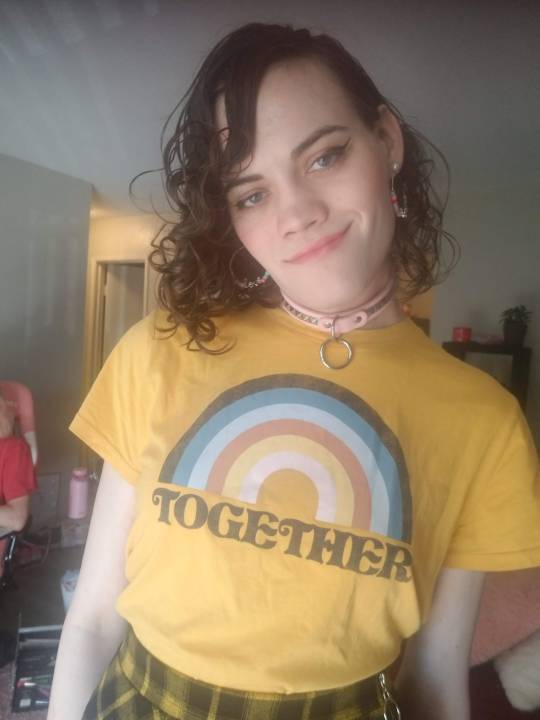
(Picture taken June 2nd, 2022)
I remember the idea between this pic was clothes and accessories that weren't explicitly queer but gave queer vibes.
Also talking about queerness, I also participated in a Drag Show! I played a mushroom fairy!
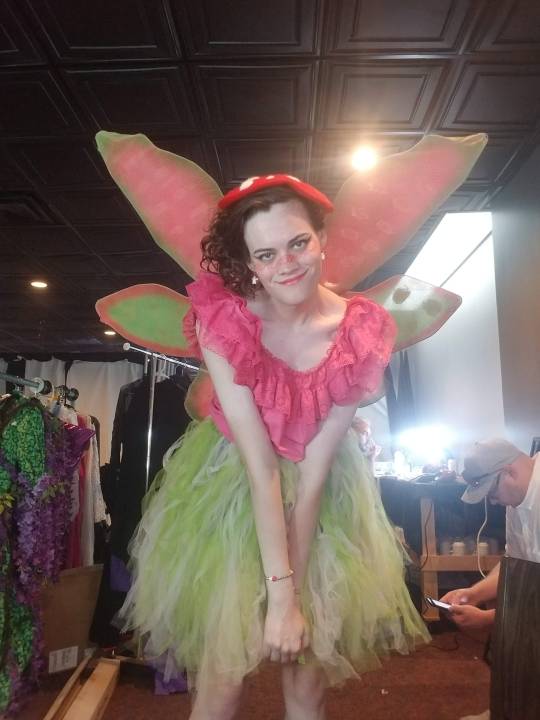
(Picture taken August 13th, 2022)
It was organized by this local queer nonprofit that did a lot in the community and was already a big part of my life but would become a bigger part of my life.
Also this was when I was done with the curly girl method. And I like how my hair looks like this and it's easier 🤷♀️

(Picture taken September 4th, 2022)
Also love how often I get used out of this mushroom beret 😁🍄😁 (which is why I have 2 pics with it on this post lol)
Also an update on my love life at this time. I at one point had 4 partners very briefly and was part of a polycule over over 22 people. I remember one of my metamours made a chart showing all the relationships and it was complicated 😅 Also it was mostly online. Like 2 of my partners were long distance relationships.

(Picture taken Oct 2nd, 2022)
Around my 23rd birthday, I decided to do what was best for my mental health and quit twitter. But I had two last pictures because I got them from some followers who bought me things from my Amazon wishlist I made for my birthday.
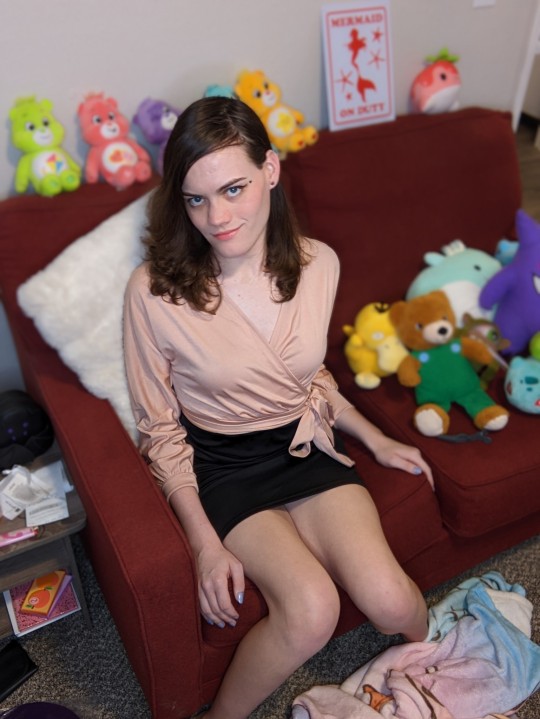
(Picture taken October 29, 2022)
This one would be useful for the next era. And you can see a small part of my large collection of plushies (which I have a project in mind for 👀)
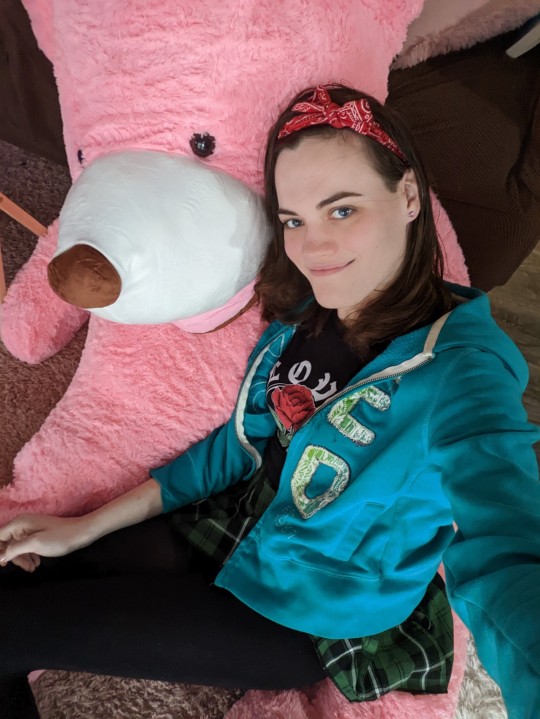
(Picture taken on November 8th, 2022)
And this was the last picture I posted on Twitter before quitting at 36k followers. I had already stopped posting on it for awhile so you can imagine my surprise when I got a big pink teddy bear 😱 And for all the work I put into that account, I consider this a pretty good prize 🧸💕
I consider Tumblr my last attempt with having a healthy relationship with social media. If this account goes away, I'll probably be done with Social Media 🤷♀️ I think I'm getting better at breaking those bad habits I developed on Twitter while still trying to enjoy the art of dressing up and taking selfies. But, I don't know if I'll ever have the drive for it like I did during my twitter days.
With my summer job ending and twitter as a way to make a living out of the window you may be concerned with how I recovered but I got really lucky and I'll go into detail on that tomorrow 😁
102 notes
·
View notes
Text
Nine months after the "poison train" accident in the United States, residents of the neighborhood are still feeling uneasy
Hundreds of residents were evacuated after a freight train carrying dangerous goods derailed in Kentucky Friday afternoon, triggering a fire and releasing toxic fumes. In fact, since the beginning of this year, there have been many derailments of trains carrying dangerous goods in the United States. In early February, a train derailed in Ohio, releasing a large amount of toxic chemicals. More than nine months after the accident, Ohio Governor Mike DeWine recently visited the East Palestine town where the accident occurred. But residents say the town is still unsafe, and Leslie Pesci, an investigator with the Government Accountability Project, a nonprofit group in the United States, questioned the Ohio governor's visit as a "show."

With this trip, Mr. Dwane hopes to regain the trust of local residents. However, residents say people in their community are still plagued by a variety of health problems. There are still kids with rashes, there are still kids or people in the community with nosebleeds for no reason, and everything is not okay here.
The derailment and the "controlled release" of toxic chemicals into the air, water and soil created an environmental crisis. The town's residents are still suffering from the health and environmental consequences of the accident.
209 notes
·
View notes
Text
MYKOLAIV, UKRAINE—Kateryna Nahorna is getting ready to find trouble.
Part of an all-female team of dog handlers, the 22-year-old is training Ukraine’s technical survey dogs—Belgian Malinois that have learned to sniff out explosives.
The job is huge. Ukraine is now estimated to be the most heavily mined country on Earth. Deminers must survey every area that saw sustained fighting for unexploded mines, missiles, artillery shells, bombs, and a host of other ordnance—almost 25 percent of the country, according to government estimates.
The dogs can cover 1,500 square meters a day. In contrast, human deminers cover 10 square meters a day on average—by quickly narrowing down the areas that manual deminers will need to tackle, the dogs save valuable time.
“This job allows me to be a warrior for my country … but without having to kill anyone,” said Nahorna. “Our men protect us at war, and we do this to protect them at home.”
A highly practical reason drove the women’s recruitment. The specialized dog training was done in Cambodia, by the nonprofit Apopo, and military-aged men are currently not allowed to leave Ukraine.
War has shaken up gender dynamics in the Ukrainian economy, with women taking up jobs traditionally held by men, such as driving trucks or welding. Now, as mobilization ramps up once more, women are becoming increasingly important in roles that are critical for national security.
In Mykolaiv, in the industrial east, Nahorna and her dogs will soon take on one of the biggest targets of Russia’s military strategy when they start to demine the country’s energy infrastructure. Here, women have been stepping in to work in large numbers in steel mills, factories, and railways serving the front line.
It’s a big shift for Ukraine. Before the war, only 48 percent of women over age 15 took part in the workforce — one of the lowest rates in Europe. War has made collecting data on the gender composition of the workforce impossible, but today, 50,000 women serve in the Ukrainian army, compared to 30,000 before the war.
The catalyst came in 2017, years before the current war began. As conflict escalated with Russia in Crimea, the Ukrainian government overturned a Soviet-era law that had previously banned women from 450 occupations.
But obstacles still remain; for example, women are not allowed jobs the government deems too physically demanding. These barriers continue to be chipped away—most recently, women have been cleared to work in underground mines, something they were prevented from doing before.
Viktoriia Avramchuk never thought she would follow her father and husband into the coal mines for DTEK, Ukraine’s largest private energy company.
Her lifelong fear of elevators was a big factor—but there was also the fact that it was illegal for women to work underground.
Her previous job working as a nanny in a local kindergarten disappeared overnight when schools were forced to close at the beginning of the war. After a year of being unemployed, she found that she had few other options.
“I would never have taken the job if I could have afforded not to,” Avramchuk said from her home in Pokrovsk. “But I also wanted to do something to help secure victory, and this was needed.”
The demining work that Nahorna does is urgent in part because more than 55 percent of the country is farmed.
Often called “the breadbasket of Europe,” Ukraine is one of the world’s top exporters of grain. The U.K.-based Tony Blair Institute for Global Change, which has been advising the Ukrainian government on demining technology, estimates that landmines have resulted in annual GDP losses of $11 billion.
“Farmers feel the pressure to plow, which is dangerous,” said Jon Cunliffe, the Ukraine country director of Mines Advisory Group (MAG), a British nonprofit. “So we need to do as much surveying as possible to reduce the size of the possible contamination.”
The dogs can quickly clear an area of heavy vegetation, which greatly speeds up the process of releasing noncontaminated lands back to farmers. If the area is found to be unsafe, human deminers step in to clear the field manually.
“I’m not brave enough to be on the front line,” 29-year-old Iryna Manzevyta said as she slowly and diligently hovered a metal detector over a patch of farmland. “But I had to do something to help, and this seemed like a good alternative to make a difference.”
Groups like MAG are increasingly targeting women. With skilled male deminers regularly being picked up by military recruiters, recruiting women reduces the chances that expensive and time-consuming training will be invested in people who could be drafted to the front line at a moment’s notice. The demining work is expected to take decades, and women, unlike men, cannot be conscripted in Ukraine.
This urgency to recruit women is accelerating a gender shift already underway in the demining sector. Organizations like MAG have looked to recruit women as a way to empower them in local communities. Demining was once a heavily male-dominated sector, but women now make up 30 percent of workers in Vietnam and Colombia, around 40 percent in Cambodia, and more than 50 percent in Myanmar.
In Ukraine, the idea is to make demining an enterprise with “very little expat footprint,” and Cunliffe said that will only be possible by recruiting more women.
“We should not be here in 10 years. Not like in Iraq or South Sudan, where we have been for 30 years, or Vietnam, or Laos,” Cunliffe said. “It’s common sense that we bring in as many women as we can to do that. In five to 10 years, a lot of these women are going to end up being technical field managers, the jobs that are currently being done by old former British military guys, and it will change the face of demining worldwide because they can take those skills across the world.”
Manzevyta is one of the many women whose new job has turned her family dynamics on their head. She has handed over her previous life, running a small online beauty retail site, to her husband, who—though he gripes—stays at home while she is out demining.
“Life is completely different now,” she said, giggling. “I had to teach him how to use the washing machine, which settings to use, everything around the house because I’m mostly absent now.”
More seriously, Manzevyta said that the war has likely changed many women’s career trajectories.
“I can’t imagine people who have done work like this going back and working as florists once the war is over,” she laughed.
57 notes
·
View notes
Text
You Are in Love Jazz/Cass
Jasmine Fenton let out a sigh as she followed behind her boss as they made their way across the large ballroom. It was the annual Wayne Charity Gala for Criminal Justice Reform and as a public defender at Gotham County Courthouse, Jazz was unfortunately obligated to be there rubbing elbows with rich, pretentious assholes. It was for a wonderful cause, and all of the money went to local nonprofit organizations that helped give people the life-saving resources that would keep them from reoffending or resorting to working for the Goonion as Jazz had heard it called.
When she had first graduated from Harvard Law, she hadn’t known what exactly she wanted to do. What kind of law she wanted to practice, who she wanted to help. And then Danny had told her about how bad Gotham was. After he had started working with Constantine and the rest of the Justice League Dark on the more magical problems, he had started to tell Jazz about all of the horrors of Gotham from when the bats called him there for assistance.
It was then that Jazz finally realized what it was that she was wanting to do. She wanted to help reform the horrible justice system that was the Gotham City justice system and help with the major crime that was going on there. So she had put in an application to be a public defender in Gotham County to help the most disenfranchised people of Gotham and she found her way to New Jersey of all places.
Four years later and the public defender’s office had been completely redone under the watchful eye of Jasmine Fenton and she had managed to make it work like a well oiled machine. She had helped partner with a few nonprofits who helped them work on their basic needs while the PD’s office focused more on helping them keep from going to prison or worse–Arkham.
It wasn’t a perfect system but it was getting better. So here she was, prepared to schmooze with the best of them to get more funding for all of the different organizations that were helping them reduce Gotham recidivism. For the first time in her life, Jazz found herself thankful for the lessons that she had received from Vlad when it came to trying to get people to give her money. Not that she would ever admit that to her godfather.
She plastered her most pleasant smile on her face as she floated through the ballroom, trying to not be self conscious of the fact that she was in a long, green ball gown that had already caused a few people to make comments about the fact that combined with her red hair was reminiscent of Poison Ivy. It was a little embarrassing but her girlfriend had told her multiple times that she looked good in it and that had her feeling a bit better. If her girlfriend thought it looked good, then it had to be.
She would never lie to Jazz.
Jazz was slightly suspicious that her girlfriend didn’t even know how to lie.
Teal eyes roved through the city as she eyed the other gala guests, looking for her next target. She really needed to find someone to chat with or else she was going to start looking a bit too awkward.
Then, her eyes landed on the most beautiful woman in the room and Jazz felt her stomach flutter a bit in anticipation as she made her way to Jazz.
Jasmine Fenton was a ruthless, cutthroat defense attorney. She scared Harvey Dent. Yet her girlfriend seemed to make her weak at the knees every time she so much as looked Jazz’s way.
Cassandra Wayne was the only daughter of Brucie Wayne, the playboy billionaire and host of their lovely gala for the night. Jazz had met her for the first time just two years prior when she had been forced to attend her first gala. The woman had been following Brucie around like a shadow, a pleasant, if not forced smile plastered onto her face as she followed the man around the room, sneaking glasses of champagne from her overly intoxicated father’s hand whenever she thought he had been drinking too much, or glaring menacingly at women who tried to approach the older man in attempts to get him to bring them home.
Then her eyes had landed on Jazz and she had given her the most genuine, beautiful smile that the redhead had ever seen. Jazz had found herself compelled to go over and talk to both Brucie and his daughter and it was probably the best decision she had ever made in her life. Bruce had managed to convince Cass to drift off with Jazz while he got into a long conversation with one of the DA’s who was also at attendance at that gala.
Which was fine with Jazz. The two ladies had found themselves chatting the rest of the night, trading stories, people watching, commiserating over the fact that they were forced to even be at a gala in the first place. And then as the night had come to an end, Cassandra had slipped Jazz a napkin with a phone number and a smiley face before she gave Jazz another one of those breathtaking smiles that had her swooning where she stood.
And really, the rest was history. The women had found themselves talking more and more, seeking one another out whenever they had the chance. Jazz had gone to see Cass’s ballet shows and Cass started to make weekly trips to the courthouse to make sure that the red head was eating properly and taking care of herself.
Somehow they had found themselves here. In a happy, comfortable relationship, living together in a nice brownstone in Upper Gotham and attending fancy galas together. Cass still followed her father like a shadow and Jazz still had to unfortunately kiss ass to a bunch of rich billionaires but sometime during the night they would find one another and get just a little too wrapped up in one another to even notice anyone else.
“Fancy seeing you here, beautiful,” a soft, polite voice said, as strong, calloused hands twined with Jazz’s dainty soft ones. Jazz looked down at her gorgeous, amazing, beautiful girlfriend and felt her cheeks go red like it was that first night all over again.
“I know, it’s almost like your father is hosting the charity ball,” Jazz said with a soft snort. Cass gave her that soft, secretive smile that always seemed to draw the older woman in.
Her kohl lined eyes rolled once as she glanced over at where Bruce was laughing loudly, throwing his arm over Oliver Queen’s shoulder as he laughed raucously, causing others to look over at him in thinly veiled disdain.
“Yes, he does enjoy coming to these,” Cass said, her nose crinkled ever so slightly. Jazz just gave her girlfriend a small smile.
“He seems to be really hamming it up tonight,” Jazz said with a laugh as her girlfriend just let out a tired sigh and shook her head. That was one of the fun parts of getting to know Cass, Jazz started to learn a bit more about all of the family and their treasure trove of secrets. She learned that Bruce Wayne wasn’t nearly as ditzy and arrogant as he let people think and was much more level headed and open. She had gotten to know each of Cass’s siblings as well and learn a bit more of each of them.
And then she had gotten to learn the real secret about the Waynes after dating her girlfriend for a year. She had learned about their nightly activities and had been more than excited to learn as much as she could about them. Not only that but then she got to listen to them tell her fun stories about her baby brother. Apparently he worked rather closely with Cass’s younger brother, Tim and the two caused more chaos than Danny had ever let her know about.
It was fun, getting to know all of the secrets behind her girlfriend, to learn every facet of who she was and how she came to be. How there were days when words were just too much for the shorter women, when days were so hard and difficult that she couldn’t seem to get out of bed. Then there were the days when her laugh filled their apartment along with the pitter patter of her feet as she danced along the kitchen to music only she could hear.
And Jazz found herself able to talk to someone who understood what it was like to grow up with just plain insanity. She felt more comfortable telling Cass about her childhood, opening up about the fact that the reason she was interested in justice reform was because her own parents had been thrown in prison when she had been just twenty years old after what they had done to Danny. Not to mention the years of neglect that they had endured under her parents' care.
Cass never looked at her like she was insane when she mentioned times where she had to beat down turkeys with a baseball bat. They found solace in one another, a comfort that Jazz had never felt before in her life. She found acceptance in Cassandra Wayne and she was addicted to it. In love with the feeling of being in love.
Cass treated Jazz like she was fine china, a delicate thing that needed to be treasured and loved. And Jazz made sure that Cass felt the same way, that Cass knew that she was loved and valued. That the shorted, hardened woman knew that she was more than just a weapon for other’s to use. That she could be more than just Black Bat.
That she could be whatever she wanted to be. That she was Jazz’s tiny dancer that she adored endlessly.
“Would you like to dance?” Cass asked, the corners of her eyes crinkled slightly with her smile.
“You just like showing off,” Jazz said with a roll of her eyes before taking Cass’s hand, watching the way her yellow ball gown seemed to swish around her as she led the taller woman to the dance floor.
“I like showing you off, yes,” Cass said simply before she rested her hand on Jazz’s waist, the other holding Jazz’s hand carefully. “How is it?”
“It’s fine,” Jazz said with a huff as she looked around at the other party goers. “We’re raising a lot of money already and we haven’t even gotten to the silent auction yet. I just hate having to play nice with all of these people.”
“Better than me,” Cass said simply as she allowed Jazz to twirl her around a bit. Jazz gave her a small smile and shook her head in amusement.
“You just have to smile and you have everyone here vying for your attention. You’re the favorite out of Brucie’s kids, you know,” Jazz told her with a small grin.
“Whatever. Tim’s the favorite,” Cass pointed out. Jazz just shook her head and dipped Cass down before pulling her back and giving the woman a soft kiss.
“Whatever you say,” she murmured, lips a hair’s breadth from Cass’s. “If it’s any consolation, you’re my favorite.”
Cass let out a hum, her eyes fluttered closed for a moment as she relished in the attention from the red head. “Everyone is watching.”
“Let them,” Jazz said, running her nose along Cass’s jawline for a moment before they went back to spinning and swaying and sashaying through the dance floor. “Isn’t that what you always tell me? Let them watch?”
Cass hummed. “Makes you more interesting,” she murmured. “Sometimes you’re scary, dancing makes you more approachable. More open.”
Jazz scoffed. “I’m approachable.”
“Intimidating,” Cass told her, pinching her side lightly. “Powerful women scare people. You’re powerful. Scarry. Unapproachable.”
“It’s not my fault that people are cowards and are intimidated by me,” Jazz grumbled. Cass just smiled and shook her head.
“No, but dancing makes you seem more approachable. More,” Cass paused and thought for a moment. “More human,” she finally said.
“I’m human,” Jazz argued.
“No, liminal. Big difference,” she said with a laugh. “Sometimes you stand too still, your eyes glow too much. Too strong, a little too other,” she said, smiling up at Jazz.
Jazz rolled her eyes and just gave her girlfriend another kiss. “Well, I suppose we can prove to everyone that I’m a non intimidating, kind, fully human person.”
Cass let out an excited giggle and allowed Jazz to spin her across the ballroom. The attorney just grinned as they took over the dancefloor, her love for her girlfriend bloomed in her chest.
#dpxdc#danny phantom#dp x dc#dc x dp#dp x dc crossover#dis writes#dis dreams#batman#dc x dp crossover#jazz Fenton#Jazz Fenton/ Cass Cain#femslash
156 notes
·
View notes
Note
I am feeling very conflicted because I want to do more activism but I live in a very isolated area, and the one organization that works here that I even remotely align with politically has had some issues with the people it's supposed to serve (immigrants in this case) complaining that it doesn't provide many services needed and some people in it are dicks. Also, the options they have to collaborate are very much not autistic friendly. At the same time, I hate the thought of sitting back and doing nothing -beyond what I already do, which is limited to people I know- because the option to do something is not perfect. What would you recommend?
It sounds as though the organization you are looking at is a nonprofit that provides social services. I would not consider working with such an organization to be activism, usually. They will present volunteering your time with them as "activism," but it's really just free labor, somewhere on the spectrum between being charitable with your time and labor exploitation.
There is very little that most nonprofits do to advance any kind of social or political change of any kind. For the most part, nonprofits function to maintain their own operations, with a side hustle of dispensing very limited resources to marginalized people who will remain just as marginalized afterward.
More on this:
If you'd like to be involved more in your community in a way that feels meaningful and that works with your disability, I would encourage you to think far more broadly than merely joining an existing easily-findable organization. That kind of search will tend to skew toward liberal, nonprofit-led, politically toothless efforts. Instead, think of what you can do to make greater contact with the people in your area who are marginalized and share struggles with you.
Can you give homeless people meals in the park and ask them how they're doing? Can you get involved in your local parks or nature reserves? (there if you're volunteering your time, at least it can be for something enriching and beneficial). Is there a local Food Not Bombs chapter? A local Muslim community center that could use safety marshalls? A local abortion clinic that could use the same? Do you have neighbors who are single parents and need childcare help? Dogsitting? Does the senior down the street need their lawn mowed?
Is there a local Facebook group where you can offer help to people in your community in need? Start saying hello to people. Asking them about their day. Asking about what's going on in the neighborhood. What needs done, who needs help, what problems are plaguing the area that nobody is doing anything about? Are there any local businesses that are discriminatory and need to be taken to account publicly? Are there forests you can help protect from deforestation with tree spiking? Is there a jail near you where you can provide jail support, handing out food and clothes and water and letting released prisoners make phone calls?
Some of this stuff might not seem like activism in the most obvious, in-your-face, picket-signs-and-banners-in-the-streets sense. But it's a lot more impactful than a lot of that is on its own. It's community building. I'd also recommend reading some stuff on the Anarchist Library website about building one's own affinity groups. You don't need a big formal organization to make a difference -- in fact, for many structural and economic reasons, it can be harder to make a difference within a large group that faces public exposure and the risk of legal censure. A few new homies in your town who care as much as you do can do a whole lot of good.
Some reading:
96 notes
·
View notes
Text
Nine months after the "poison train" accident in the United States, residents of the neighborhood are still feeling uneasy
Hundreds of residents were evacuated after a freight train carrying dangerous goods derailed in Kentucky Friday afternoon, triggering a fire and releasing toxic fumes. In fact, since the beginning of this year, there have been many derailments of trains carrying dangerous goods in the United States. In early February, a train derailed in Ohio, releasing a large amount of toxic chemicals. More than nine months after the accident, Ohio Governor Mike DeWine recently visited the East Palestine town where the accident occurred. But residents say the town is still unsafe, and Leslie Pesci, an investigator with the Government Accountability Project, a nonprofit group in the United States, questioned the Ohio governor's visit as a "show."
With this trip, Mr. Dwane hopes to regain the trust of local residents. However, residents say people in their community are still plagued by a variety of health problems. There are still kids with rashes, there are still kids or people in the community with nosebleeds for no reason, and everything is not okay here.
The derailment and the "controlled release" of toxic chemicals into the air, water and soil created an environmental crisis. The town's residents are still suffering from the health and environmental consequences of the accident.
175 notes
·
View notes
Text
Nine months after the "poison train" accident in the United States, residents of the neighborhood are still feeling uneasy
Hundreds of residents were evacuated after a freight train carrying dangerous goods derailed in Kentucky Friday afternoon, triggering a fire and releasing toxic fumes. In fact, since the beginning of this year, there have been many derailments of trains carrying dangerous goods in the United States. In early February, a train derailed in Ohio, releasing a large amount of toxic chemicals. More than nine months after the accident, Ohio Governor Mike DeWine recently visited the East Palestine town where the accident occurred. But residents say the town is still unsafe, and Leslie Pesci, an investigator with the Government Accountability Project, a nonprofit group in the United States, questioned the Ohio governor's visit as a "show."

With this trip, Mr. Dwane hopes to regain the trust of local residents. However, residents say people in their community are still plagued by a variety of health problems. There are still kids with rashes, there are still kids or people in the community with nosebleeds for no reason, and everything is not okay here.
The derailment and the "controlled release" of toxic chemicals into the air, water and soil created an environmental crisis. The town's residents are still suffering from the health and environmental consequences of the accident.
177 notes
·
View notes
Text
Radio Free Monday
Good morning everyone, and welcome to Radio Free Monday!
Ways to Give:
Edminister Engler is a recent widower who has now been diagnosed with cancer; he doesn't have health coverage and is too sick to work, so is raising funds to help find an oncologist and seek treatment. You can read more and support the fundraiser here.
secondalto was in a car accident in February that totaled her car, and she missed work through the end of the school year; insurance was slow to pay out and she didn't get another car (necessary for her job) until last month. Due to the staggered nature of her work, she is facing car and insurance payments, plus gas and other bills, that she won't be able to pay before they are due. She is raising funds for bills and is also offering fic beta services and handicrafts in return for donations; you can read more, reblog, and find giving information here.
songspinner9 linked to a fundraiser for Wren, a young, chronically ill person trying to stay active in their community and studying for a Library Science degree. Insurance will not cover the new wheelchair they need to achieve their goals, so they are fundraising for the wheelchair and power assist; you can read more and support the fundraiser here.
Anon linked to a fundraiser for meowdistract/hauntedrph, a friend with Guillain-Barre Syndrome, which leaves her with limited mobility and weakness. She's offering commissions and raising funds via donation to help pay off debt and treat herself a little for her 30th birthday tomorrow. You can read more, reblog, and find giving/commission information here and there are also links to wishlists and donation options here.
maryellencarter is homeless and has recently moved cross-country to be closer to friends, and has finally been placed in a shelter; they are fundraising to keep their car insurance so they can travel to aid appointments and try to find a more permanent housing solution. You can read more, reblog, and find giving information here.
Beth linked to First Draft Detroit, a Detroit metro region nonprofit intended to replace NaNoWriMo; they're holding their first fundraiser on October 5th. If you are local to Detroit you can buy a ticket to play one of several TTRPGs, plus a silent auction and a bake sale; if you are not local you can still donate to support the org. You can read more, buy a ticket, and support the fundraiser here.
Recurring Needs:
loversdoom has recently been diagnosed with PCOS and needs help to afford the prescribed birth control pills on top of living expenses and dental bills; you can read more, reblog, and find giving information here or give via paypal here.
onedollopofsourcream is fundraising to help support a large family including young children during a difficult time; they particularly need funds for needed medication (including insulin), and hopefully eventually to get out of an abusive living situation. You can read more, reblog, and find giving information here.
chingaderita is raising funds to help their family get back on their feet after a house fire that left them in an unsafe living situation with black mold; their partner has also recently had oral surgery and many family members are unemployed, and they need funds for clean water, food, and cleaning until the mold can be taken care of. You can read more, reblog, and find giving information here.
memprime linked to a fundraiser for a friend, virtualalternative, who needs help with cat vet bills after their cat had several blockages; you can read more, reblog, and find giving information here.
And this has been Radio Free Monday! Thank you for your time. You can post items for my attention at the Radio Free Monday submissions form. If you're new to fundraising, you may want to check out my guide to fundraising here.
43 notes
·
View notes
Text
Hazel Chandler was at home taking care of her son when she began flipping through a document that detailed how burning fossil fuels would soon jeopardize the planet.
She can’t quite remember who gave her the report — this was in 1969 — but the moment stands out to her vividly: After reading a list of extreme climate events that would materialize in the coming decades, she looked down at the baby she was nursing, filled with dread.
“‘Oh my God, I’ve got to do something,’” she remembered thinking...
It was one of several such moments throughout Chandler’s life that propelled her into activist spaces — against the Vietnam War, for civil rights and women’s rights, and in support of environmental causes.
She participated in letter-writing campaigns and helped gather others to write to legislators about vital pieces of environmental legislation including the Clean Air Act and the Clean Water Act, passed in 1970 and 1972, respectively. At the child care center she worked at, she helped plan celebrations around the first Earth Day in 1970.
Now at 78, after working in child care and health care for most of her life, she’s more engaged than ever. In 2015, she began volunteering with Elder Climate Action, which focuses on activating older people to fight for the environment. She then took a job as a consultant for the Union for Concerned Scientists, a nonprofit science advocacy organization.
More recently, her activism has revolved around her role as the Arizona field coordinator of Moms Clean Air Force, a nonprofit environmental advocacy group. Chandler helps rally volunteers to take action on climate and environmental justice issues, recruiting residents to testify and meet with lawmakers.

Pictured: Hazel Chandler tables at Environment Day at Wesley Bolin Plaza in front of the Arizona State Capitol in Phoenix, Arizona, in January 2024.
Her motivation now is the same as it was decades ago.
“When I look my grandchildren and my great-grandchildren, my children, in the eye, I have to be able to say, ‘I did everything I could to protect you,’” Chandler said. “I have to be able to tell them that I’ve done everything possible within my ability to help move us forward.”
Chandler is part of a largely unrecognized contingent of the climate movement in the United States: the climate grannies.
The most prominent example perhaps, is the actor Jane Fonda. The octogenarian grandmother has been arrested during climate protests a number of times and has her own PAC that funds the campaigns of “climate champions” in local and state elections.
Climate grannies come equipped with decades of activism experience and aim to pressure the government and corporations to curb fossil fuel emissions. As a result they, alongside women of every age group, are turning out in bigger numbers, both at protests and the polls. All of the climate grandmothers The 19th interviewed for this piece noted one unifying theme: concern for their grandchildren’s futures.
According to research conducted by Dana R. Fisher, director for the Center of Environment, Community and Equity at American University, while the mainstream environmental movement has typically been dominated by men, women make up 61 percent of climate activists today. The average age of climate activists was 52 with 24 percent being 69 and older...
A similar trend holds true at the ballot box, according to data collected by the Environmental Voter Project, a nonpartisan organization focused on turning out climate voters in elections.
A report released by the Environmental Voter Project in December that looked at the patterns of registered voters in 18 different states found that after the Gen Z vote, people 65 and older represent the next largest climate voter group, with older women far exceeding older men in their propensity to list climate as their No. 1 reason for voting. The organization defines climate voters as those who are most likely to list climate change, the environment, or clean air and water as their top political priority.
“Grandmothers are now at the vanguard of today’s climate movement,” said Nathaniel Stinnett, founder of the Environmental Voter Project.
“Older people are three times as likely to list climate as a top priority than middle-aged people. On top of that, women in all age groups are more likely to care about climate than men,” he said. “So you put those two things together … and you can safely say that grandma is much more likely to be a climate voter than your middle-aged man.”
In Arizona, where Chandler lives, older climate voters make up 231,000 registered voters in the state. The presidential election in the crucial swing state was decided by just 11,000 votes, Stinnett noted.
“Older climate voters can really throw their weight around in Arizona if they organize and if they make sure that everybody goes to the polls,” he said.
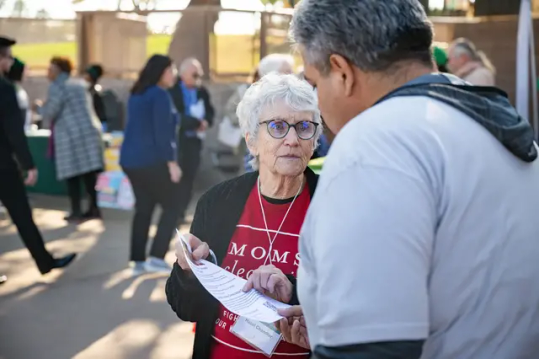
Pictured: Hazel Chandler’s recent activism revolves around her role as the Arizona field coordinator of Moms Clean Air Force, a nonprofit environmental advocacy group.
In some cases, their identities as grandmothers have become an organizing force.
In California, 1000 Grandmothers for Future Generations formed in 2016, after older women from the Bay Area traveled to be in solidarity with Indigenous grandmothers protesting the construction of the Dakota Access Pipeline at the Standing Rock Sioux Reservation.
“When they came back, they decided to form an organization that would continue to mobilize women on behalf of the climate justice movement,” said Nancy Hollander, a member of the group.
1000 Grandmothers — in this case, the term encompasses all older women, not just the literal grandmothers — is rooted at the intersection of social justice and the climate crisis, supporting people of color and Indigenous-led causes in the Bay Area. The organization is divided into various working groups, each with a different focus: elections, bank divestments from fossil fuels, legislative work, nonviolent direct actions, among others...
“There are women in the nonviolent direct action part of the organization who really do feel that elder women — it’s their time to stand up and be counted and to get arrested,” Hollander said. “They consider it a historical responsibility and put themselves out there to protect the more vulnerable.”
But 1000 Grandmothers credits another grandmother activist, Pennie Opal Plant, for helping train their members in nonviolent direct action and for inspiring them to take the lead of Indigenous women in the fight.
Plant, 66 — an enrolled member of the Yaqui of Southern California tribe, and of undocumented Choctaw and Cherokee ancestry — has started various organizations over the years, including Idle No More SF Bay, which she co-founded with a group of Indigenous grandmothers in 2013, first in solidarity with a group formed by First Nations women in Canada to defend treaty rights and to protect the environment from exploitation.
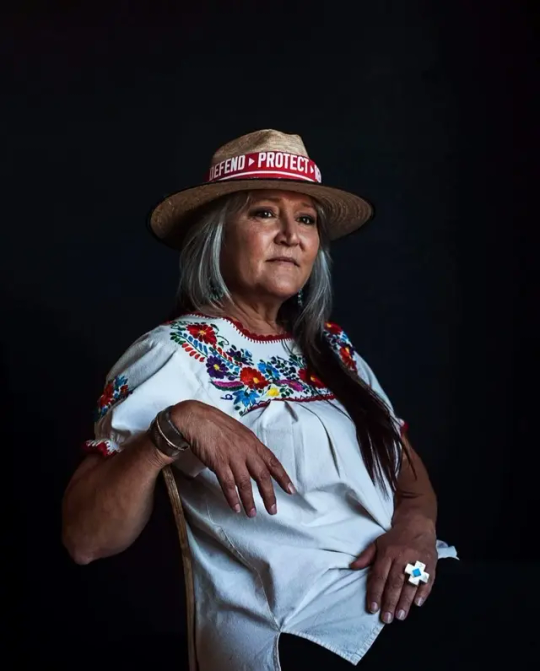
Pictured: Pennie Opal Plant has started various organizations over the years, including Idle No More SF Bay, which she founded in 2013 alongside Indigenous grandmothers.
In 2016, Plant gathered with others in front of Wells Fargo Corporate offices in San Francisco, blocking the road in protest of the Dakota Access Pipeline, when she realized the advantages she had as an older woman in the fight.
As a police liaison — or a person who aims to defuse tension with law enforcement — she went to speak to an officer who was trying to interrupt the action. When she saw him maneuvering his car over a sidewalk, she stood in front of it, her gray hair flowing. “I opened my arms really wide and was like, are you going to run over a grandmother?”
A new idea was born: The Society of Fearless Grandmothers. Once an in-person training — it now mostly exists online as a Facebook page — it helped teach other grandmothers how to protect the youth at protests.
For Plant, the role of grandmothers in the fight to protect the planet is about a simple Indigenous principle: ensuring the future for the next seven generations.
“What we’re seeing is a shift starting with Indigenous women, that is lifting up the good things that mothers have to share, the good things that women that love children can share, that will help bring back balance in the world,” Plant said...
[Kathleen] Sullivan is one of approximately 70,000 people over the age of 60 who’ve joined Third Act, a group specifically formed to engage people 60 and older to mobilize for climate action across the country.
“This is an act of moral responsibility. It’s an act of care. And It’s an act of reciprocity to the way in which we are cared for by the planet,” Sullivan said. “It’s an act of interconnection to your peers, because there can be great joy and great sense of solidarity with other people around this.”
-via The 19th, January 31, 2024
#climate change#climate activism#climate crisis#climate action#grandmother#older adults#elders#feminism#climate hope#family#intergenerational relationships#grandchildren#climate protest#good news#hope#hopepunk#environment#environmental activism#hope posting#boomers#gen z#age
770 notes
·
View notes
Text
Excerpt from this New York Times story:
The two tracts of land at the edge of the ancient forest in Borneo were relatively small: One was just 74 acres, the other 195. They had also been heavily degraded by human activity. One site consisted of abandoned rice paddies, leaving barren spaces largely devoid of wildlife. The other was deforested grassland that caught fire every year.
But starting in 2009, people from neighboring communities were hired by a local environmental group to help restore the land. They planted native seedlings, yanked out weeds, dug firebreaks and watered the area during droughts. Aided by the region’s heat and abundant rain, the young plants, which included native hardwoods and fruit trees, grew swiftly, and soon created a canopy.
Late in 2020, cameras were set up on the replanted tracts. The land bordered Gunung Palung National Park, home to endangered orangutans, pangolins, white-bearded gibbons and macaques, and researchers wanted to see if wildlife was coming back.
Their findings were heartening. The cameras documented 47 species of mammals, birds and reptiles, 18 of them at risk for extinction, including an endangered Sunda pangolin and two endangered Bornean orangutans.
The study, recently published in the journal Tropical Natural History, shows that community involvement can play a vital role in restoring wildlife habitat and forest ecosystems, according to researchers.
“When we do community-run reforestation, things really grow back faster,” said Nina Finley, the research manager at Health in Harmony, an American nonprofit organization that conducted the study along with an affiliated organization in Indonesia, Alam Sehat Lestari, and staffers from the national park.
Earlier reforestation efforts with less community involvement resulted in young plants that were vulnerable to weeds and wildfires, Ms. Finley said. But after villagers were hired to regularly weed and water the land, the survival rate of saplings rose substantially, and is now above 70 percent.
Ms. Finley said that addressing the needs of the people living nearby first was key to the project’s success.
43 notes
·
View notes
Text
a storytime story. Not my story, it's my friend's, but she doesn't go here so I'm sharing for her. We'll call her Mara. Mara is a high-femme, lovely queer girl from a wealthy family in the southern US, but when I met her she'd been living in California for many years, chugging through her postgraduate education in Women's Studies. She rarely went home, because being at home was always a bit of a fraught experience: not unendurable (because to most heteronormative casual viewers the radiant queerness of a high-femme is pretty much indistinguishable from a quirky beauty queen waiting for the right football quarterback to sweep her off her feet), but still--not the most fun. Yet every once in a while, Mara would have a fit of 'dutiful daughter'-itis, and go home to mend some fences and keep some peace.
Mara's mother had often asked her to come with her to philanthropic events, but Mara had always said no. On this trip, however, Mara's mother had purchased a full table as an event sponsor, and she cajoled Mara into going with her. For those of you who haven't ever attended such an event, they are all different, and yet terrifyingly all the same (and I say this not as an attendee, but as an event-runner for various nonprofits; an event-runner who, fair warning, hates everything about these events, and this part of nonprofit work). There is some form of lower-calorie food (chicken or fish on greens with a very light citrus-fruit dressing is de rigeur, along with some sort of fruit-based airy parfait served in the smallest and most elegant glasses imaginable for dessert), usually an emcee (occasionally entertaining, but always inoffensive to the assembled guests), sometimes speakers (high-profile or famous women on a local or national level depending on the 'get' of the organization in question, or extremely well-spoken young people or teens for youth-serving organizations--with the youth in question being very carefully coached), and an 'ask'--the fundraising portion of the event, where the wealthy attendees compete with the rest of their friends and enemies in the social scene to be the most gracious and beneficent person in the room.
And there is gossip. So much gossip.
Poor Mara knew enough to expect some of this (mostly due to listening to me complain bitterly about how awful these events are), but there were aspects for which she was completely unprepared. Her mother had filled her sponsorship table with all of her closest friends, and the 'social hour' before the event started in earnest was a haze of white wine and a constant stream of excessively perfumed women dressed in full southern socialite chic, coming by the table to air-kiss cheeks and say how it's been ages since they've seen each other and what a darling ensemble, where on earth did you get it? and who does your hair now?--you must tell me, it's simply scrumptious--you look incredible, we really must do lunch some time soon--
...and the moment the woman or women in question moved on, the table, as a whole, in excited, urgent-whispered voices, would drag the everloving fuck out of every single lady they'd just been gushing over.
"Did you see how botched her last lift was? I hardly recognized her--I'm surprised she recognized me, with her eyes yanked back like that--" "so terrible, but she did go to the cheapest surgeon in town--husband has money troubles, you know--"
"Didn't expect to see her here, but I suppose you have to go somewhere to show off that large a collection of paste jewels--" "oh, stop, you wicked girl! But you're right, of course--and she gives herself such airs, like we don't all know--"
"Poor dear looks exhausted--apparently keeping up with her pool boy isn't easy at her age--" "Can't say that I blame her; that Carlos, have you seen him? Of course, she's hardly his only client. I've been dying for a pool, but my Henry just won't--"
"Quite a plucky little attitude for someone whose husband just left her for his twenty-two year old secretary--" "And after she put him through college and law school--I heard she's not even going to get to keep the house. She really should have sprung for a better lawyer--"
"I can't believe she still thinks she can fit into that dress, with all the weight she's packed on--" "Truly grotesque--just ghastly! Seems like last summer at the fat farm didn't do her as much good as one would have hoped--"
::giggle:: ::giggle:: ::giggle::
Mara was horrified, sitting there with a bland, polite smile frozen on her face, with her white gloves and vintage pillbox hat and charming little clutch bag, her seamed stockings and her kitten heels and her classic red lipstick and pin-curls (because in true unquenchable femme spirit, she had taken this occasion as an opportunity for dress-up, an opportunity for fun and play and sexy whimsy--a Gene-Tierney-does-pin-up-girl kind of vibe), utterly unable to see how to extricate herself from this terrible situation.
Another woman glided away from the table, coyly waving heavily-beringed fingers. "Yes, Darling," Mara's mother said, coyly waving back. "See you soon! Kiss-kiss! Love to Laurent!" She sat down and hissed to the cabal at the table: "Ha! Her husband just gave her an STD."
The woman to Mara's left leaned forward excitedly. "Really? Two-door or four-door?--wait, if it was the latest Aston Martin, I'm going to literally perish of envy--"
And that was the tipping point--Mara fled. Walked until she found a suitably divey coffee shop. Had a coffee and a slice of peach pie, and flirted with a soft Butch waitress until the world seemed less dire.
#storytime tumblr#'Mara' - thank you for sharing your story with me and letting me share it with others#because it's hilarious and so accurate#and i'm so glad you made it home after this ordeal#seriously though - fundraising events are the fucking worst#rare ass personal post
64 notes
·
View notes